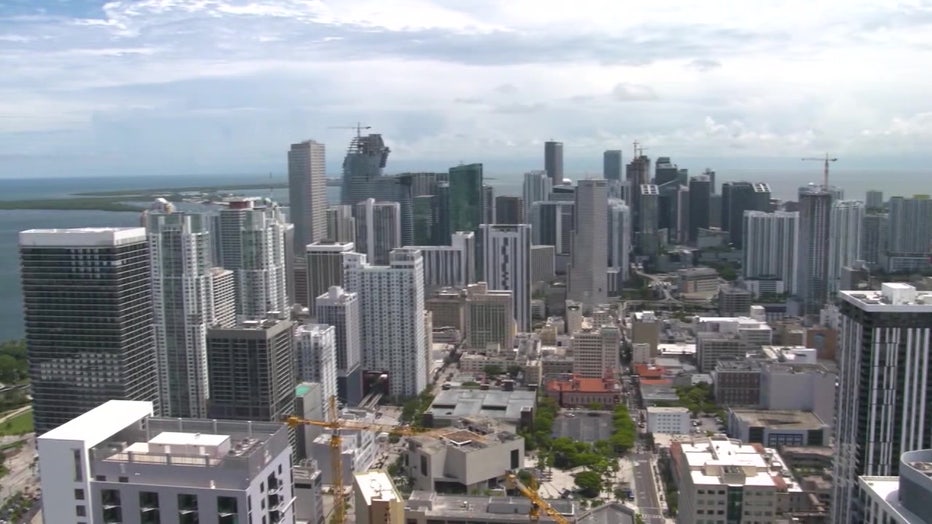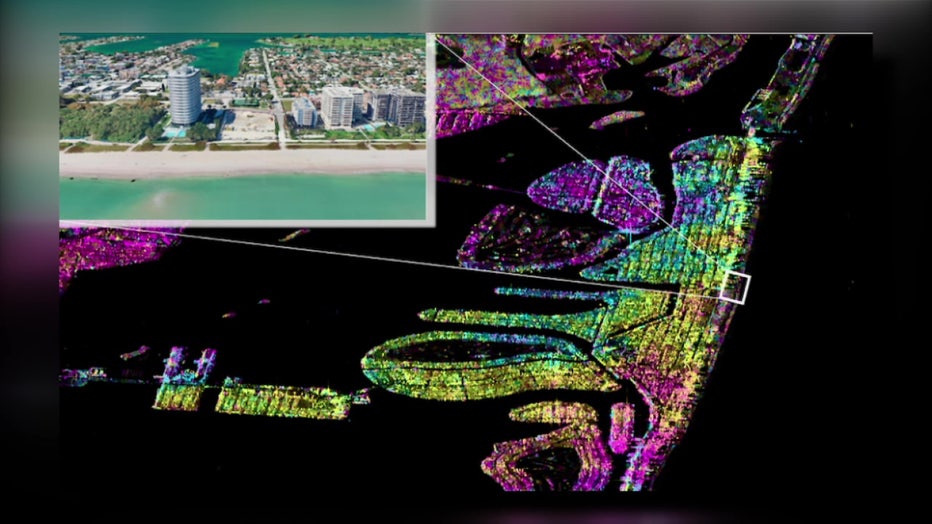Florida high rise study: Researchers find ‘unexpected settling’ in some areas of east coast high rises
Study finds settling of South Florida Buildings
FOX 13's Kylie Jones reports on a study out of the University of Miami that shows some high-rise buildings along Florida's East Coast experienced what they are calling 'unexpected settling.'
CORAL GABLES, Fla. - Researchers in South Florida made some unexpected discoveries in the ground beneath several dozen buildings along the east coast.
Professors and researchers at the University of Miami shared the results of a new study that some of them call a "game changer." The study found that some areas along the east coast of South Florida had settled unexpectedly.
"Triggered by the tragic accidents in the Champlain Tower, where we wanted to know what happens to the coastal areas here in Florida," Professor Gregor Eberli said.

High rise buildings in Miami.
Researchers studied 35 buildings from Miami Beach to Sunny Isles Beach and looked at data from 2016 to 2023.
"Because South Florida is a limestone area where we usually do not have a lot of settlement," Eberli said.
Eberli says there usually isn’t much subsidence or settling with this composition.
Researchers used satellite-based technology to study radar reference points throughout different parts of the buildings. According to the study, some reference points were in areas like balconies, rooftop air conditioning units, and boardwalks.
Eberli says they studied how the elevation changed over time.
READ: Rays stadium deal: What's next for the team after Pinellas, St. Pete leaders approve bonds?
"There was a subsidence," Eberli said. "The ground was lowering itself over this time period. It was not everywhere, and it was more increased to the north than to the south."
Researchers found a subsidence, or settling, ranging from two to eight centimeters.
"Interestingly enough, the Champlain Tower, during the time of the collapse, did not have any subsidence," Eberli said. "So, it was not a cause of the failure of the structure."
Eberli says subsidence had nothing to do with the Surfside condo collapse. Eberli also says settling is normal and often caused by the vibrations from heavy construction.
"It's not like the building will go into the ground like an elevator," Eberli said. "It's actually the whole area around it, about 200 yards, that was pushed down a little bit by the weight of the building."
Eberli continued, "So you will never find cracks around the building. When you go and look, ‘Is this building going down?’ And, we would never see this."
READ: Operation Toy Soldier brings smiles to military families, veterans ahead of Christmas
The study found that some of this settling can continue though for years.
Eberli says this doesn’t signal immediate danger, though. He says people should not be alarmed and that this process is natural.
"It has nothing to do with immediate concerns," Eberli said. "The buildings are safe."
Eberli says it didn’t appear that the settling impacted entire areas. Instead, he says individual buildings showed signs of settling.
Eberli says this satellite technology helps quantify this process, which can be valuable for the future.
He says they hope to study other parts of the state and answer more questions about long-term implications.
READ: St. Pete business giving local artists an opportunity to thrive
"Why do some buildings go further down than others, and when does it stop?" Eberli said.

Graphic showing the resettlement in South Florida high-rises.
Eberli says, because of the composition of the ground in parts of the west coast of Florida, they could have similar findings.
"Some of the buildings sit above these sand layers and have limestone on top, and it will be the same process over there," he said. "If we measure it in Tampa, I would predict that we will also see settlement or subsidence in these areas."
Researchers say data from this satellite technology could also be key for future construction and design and allow for more proactive safety measures.
Professors at the University of Miami say there is still much more research on this data.
STAY CONNECTED WITH FOX 13 TAMPA:
- Download the FOX Local app for your smart TV
- Download FOX Local mobile app: Apple | Android
- Download the FOX 13 News app for breaking news alerts, latest headlines
- Download the SkyTower Radar app
- Sign up for FOX 13’s daily newsletter

